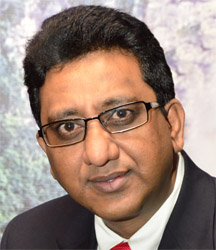The views of citizens on the abolishing of laws against gay sex are of “paramount importance” but the decision of the court on a lawsuit challenging the constitutional validity of laws that prohibit cross-dressing will also determine government’s action in this regard, Attorney General and Minister of Legal Affairs, Anil Nandlall says.
Amid a call by former Speaker of the National Assembly, Senior Counsel Ralph Ramkarran that Nandlall ought to advise the government “that the unconstitutional laws against homosexuality should not prevail,” Nandlall when contacted by Stabroek News yesterday said that there are other legal implications particularly the Saving of Existing Laws provision in the Constitution which have to be considered. “I don’t think Mr. Ramkarran addressed his mind to that legal implication,” he said.

The provision – which Nandlall emphasized, is a “fundamental” issue – saves existing laws which were enforced before the Constitution came into force by expressly stating that those existing laws will not be unconstitutional although they may be inconsistent with the Constitution.
Following an appearance before the United Nations Human Rights Council for the Universal Periodic Review (UPR) process, government had committed to holding national consultations to review the death penalty and sexual orientation discrimination and had said that the outcome would be reflected in the country’s laws. The UN Human Rights Council recommended that the state repeal all laws which discriminate against persons based on their sexual orientation and gender identity. These include sections 351, 352 and 353 of the Criminal Law (Offences) Act Chapter 8:01 which penalize consensual forms of intimacy between adult men in private with prison sentences ranging from two years to life imprisonment, and section 153 (1) (xlvii) of the Summary Jurisdiction (Offences) Act Chapter 8:02 which criminalises cross-dressing.
The government has also faced calls by rights organizations and advocates to abolish those laws and following the arrest of seven males in February 2009 for wearing female attire, four of those persons and the Society Against Sexual Orientation Discrimination (SASOD) filed a suit against the state challenging the constitutional validity of those laws. The case is currently before the court.
Guaranteed
“Those proceedings are pending and as a result of that it may not be proper to comment…on it,” Nandlall said yesterday when asked about the repealing of those laws. He, however, acknowledged the need to re-examine some ‘old’ legislation against the current Constitutional provisions. “We have to look at the Constitution and see how it protects sexual orientation and to see the extent to which that is guaranteed as a right to citizens and review legislation which may be contrary to that constitutional freedom,” he said.
The three issues that have to be considered, the Attorney-General said, are the fact that there is a direct challenge to the legislation already pending in the court, the Saving of Existing Laws provision and the fact that government will have to review the laws against the current Constitution.
Nandlall pointed out that some of the laws were formulated and enacted 50 or more years ago when Guyana was not independent and since 1966, the Constitution has changed several times. “We have to look at the current formulation and examine legislation against current constitutional provisions,” he said.
With regards to the pending court case, he said that the court’s ruling will determine the action government will take. If the court rules that the provision in the legislation is in violation of the Constitution then the court will make an order to strike down that legislation and government will have to comply or can file an appeal, the AG explained. As an example, he pointed to the amendments to the Sexual Offences Act of 2009 which were recently tabled following a decision of the High Court that certain provisions in that Act were unconstitutional. He noted that government chose not to appeal but to table the amendments.
Nandlall also said that consultations are crucial. “Government in these circumstances will have to consult widely before embarking on a course to change the current status quo,” he said. He pointed to the special parliamentary committee that is to deal with the issue. “A fundamental principle in lawmaking which we must adhere to is that a state cannot impose a law on the citizens if that law is not embraced by the citizens. Therefore, the citizens’ view on this matter is of paramount importance,” he said.
Inclined
Meantime, asked about APNU’s position with regards to the abolishing of laws against homosexual sex, the partnership leader, David Granger said that while the matter has been discussed, the political grouping has not completed its consultations. “We abide by the international conventions to which Guyana had adhered,” he, however, said.
Granger added that they are “inclined” to civil liberties and international ideas concerning civil freedoms. “Some of us feel that it should be permitted between consenting adults” and should not be legislated, he said. “We feel that human rights, individual rights should be the most important consideration.”
Recently, Chief of Staff of the Guyana Defence Force, Commodore Gary Best said that the army would not discriminate against soldiers on the basis of their sexual preference. Ramkarran has welcomed the army’s decision as an important step forward for human rights in the country and he has said that government should follow its lead and abolish the unconstitutional laws against homosexuality.
Best’s statement came in the wake of the sanctioning of two female soldiers after a recording of them in a sexual act leaked to the public. Ramkarran, in response to reports about the two women soldiers, had previously criticised homophobia in the disciplined services. He had also knocked the government’s reluctance to address homosexuality frontally as well as the opposition acceding to the “charade” of ‘public consultation’ which he said, is a thinly veiled attempt to sidestep the issue.





